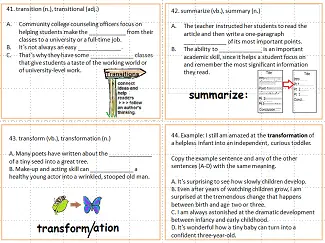| Back to Back Issues Page |
 |
|
English Detective #55, Basic Academic Vocabulary for Writing and Tests, 9-1-15 September 01, 2015 |
#55, Basic Academic Vocabulary for Writing and Tests, 9-1-15
If you have very limited time to explicitly teach (or learn) academic vocabulary, concentrate on the essentials: the language of instructions and test prompts. Students probably have at least a vague idea of the meaning of words like describe, demonstrate, identify, and analyze, but the more clearly they understand them, the better they will do on tests, writing assignments, and even reading comprehension, in school, college, and the professional world. Vocabulary.com has an excellent article on the need to learn test prompt vocabulary. They quote Jim Burke, who points out "You cannot expect to succeed on assignments if you do not understand the directions." They also have exercises to help students practice Burke’s 358 recommended words. For the last year or so I have been pondering ways to help students understand those and other very useful academic words—for those unwilling or unable to practice extensively on Vocabulary.com. I finally put together a pdf with lesson plans that teach and give explicit practice with just over 35 words- Burke’s 15, 10 others he uses to help explain them, and a few other very frequently used words from Coxhead’s Academic Word List. The words are introduced using fairly simple articles that discuss and demonstrate essay writing. Students can practice them with task cards and a crossword puzzle, as well as reading them again in later articles, including one that asks them to choose the best transition words and another that has them proofread an essay. The packet turned out to be longer (38 pages plus answer keys, etc.) and much more time-consuming than I originally anticipated, but it does offer at least 5-6 uses of most of the words (to let students see them in different contexts and to fix them in long-term memory.) It also is a fairly simple introduction to English essay writing and proof-reading for ELLs, giving examples of comparative and cause and effect essays (as well as a hybrid comparative/persuasive essay) and links to others, as well as ideas for one they can write. I’m proud enough of it that I just had to share it here. You can download it at Vocabulary Worksheets for an introductory price of $6.50. 
If you do try it, please let me know what you think, and any criticisms or suggestions. You can send them to me by replying to this newsletter. (If you do send comments, I would be glad to send you another of my pdfs free or at a major discount in return for the feedback. Let me know which you would be interested in.) Also well-worth reading: Colorin Colorado’s article on CALPS, helping ELLs with academic language in the content areas, and the need for “mortar” (connecting and qualifying expressions like ‘even though,’) as well as the academic words themselves. (Many of those expressions are taught in my pdf above, as well as on EnglishHints’ Transition Words practice page.) The Colorin Colorado article has a very interesting chart of the differing meanings of common English words in different disciplines. For example, English teachers teach the ”plot” of a story, but math teachers show students how to “plot” coordinates, and history teachers may discuss a “plot” to overthrow the government. (There’s also a “plot” of land or a cemetery “plot!”) Here’s a video playlist from colorin colorado, along with other resources. The playlist has 10 videos—half are about a minute, several more are 3 minutes, and the first two are 16-21 min. See especially #3, 5, 6, & 7— very short & useful. (So are the others, if you have time.) Here’s another page with some great ideas for teaching vocabulary from elt-connect. A note if you get gmail: Have you missed any issues of English Detective? if you find English Detective in your Promotions box, you can move it to your Primary box (if you want) by clicking on it and dragging it there, then clicking Yes when asked if you want to always get it in the Primary box. P.S. If you are not already getting English Detective, you can subscribe by completing the form here. (It's free!) Also, you can reach me by mail at 1752 Driftwood Drive, El Centro, CA 92243, USA. |
| Back to Back Issues Page |